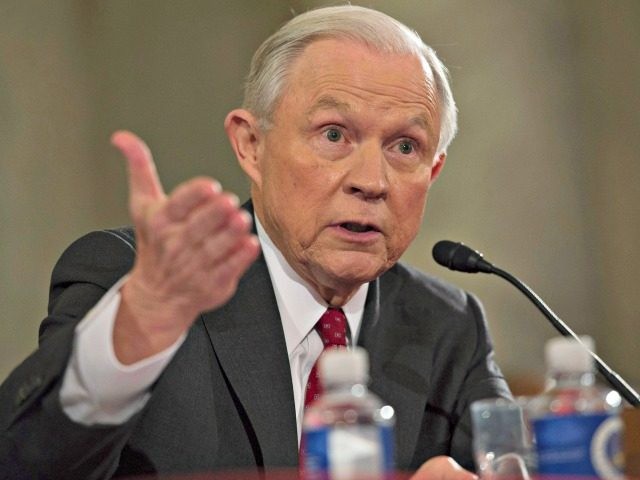Three people who claim to have been at a March 2016 meeting where short-lived Trump campaign aide George Papadopoulos suggested reaching out to Russians told Reuters that Attorney General Jeff Sessions was not as negative on the proposal as he told Congress in November.
One of the sources is claiming Sessions merely “said something to the effect of ‘okay, interesting'” to Papadopoulos before moving on. Another told Reuters, “It was almost like, ‘Well, thank you and let’s move on to the next person.’”
Reuters portrayed the claims as a major scoop in a Sunday report, strongly implying Sessions would face problems because he told the House Judiciary Committee under oath, “Yes, I pushed back,” when he was asked if he “pushed back” on Papadopoulos’s suggestion. Press outlets further to Reuters’s left quickly latched onto the report, seeing it as a major break in the “Russia Investigation.”
All three unnamed sources are said to be cooperating with Special Counsel Robert Mueller’s investigation. No indication is given as to why all three decided to go to the press two years after the meeting and four months after Sessions testified before the House Judiciary Committee.
Meanwhile, a source who went on the record, Trump campaign Director of National Security J.D. Gordon, stood by his earlier account, backing Sessions’s claim he “strongly opposed Papadopoulos’ proposal.”
Democrats and left-leaning commentators have repeatedly tried to put Sessions in jeopardy over minor discrepancies in accounts he has given Congress regarding meetings with Russians during the 2016 campaign. Sessions neglected to mention two brief encounters with Russian Ambassador Sergei Kislyak during his confirmation hearings for the attorney general’s spot. He has since vigorously combated Democrats’ efforts to portray that fact as evidence of deliberate deception or collusion with Russia.
To evaluate this latest claim – that Sessions may merely have ignored Papadopoulos rather than countered him in front of the 2016 meeting – Reuters interviewed two solidly liberal law professors: George Washington University’s Jonathan Turley and Pace University’s Bennett Gershman. Both were reluctant to say Sessions could face perjury charges, even if the three sources’ claims were entirely true.
Turley indicated that Sessions’s statement he “pushed back” might, in Reuters’s words “be too vague to form the basis of a perjury case because there could be different interpretations of what he meant.” Gershman noted how difficult it was to prove perjury, but thought it might be possible in this case. “Proving there was intent to lie is a heavy burden for the prosecution. But now you have multiple places where Sessions has arguably made false statements,” he told Reuters.

COMMENTS
Please let us know if you're having issues with commenting.